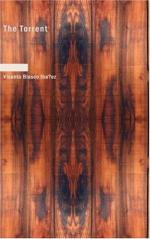Her face was an inspiring thing to look upon. She seemed to have gone mad! Her blond hair had fallen awry and was flecked with leaves and grass and bark. Her green eyes flashed with metallic glints, like daggers. Her lips were pale from emotion. And in that wild posture, whether through force of habit, or the suggestiveness of the effort she had made, she raised her warcry—a piercing, savage “Hojotoho!” that rent the calm of the orchard, frightening the hens and sending them scampering off over the paths. Her parasol she brandished as if it were the lance of Wotan’s daughter, and several times she aimed it at Rafael’s eyes, as if she intended to spear him blind.
The youth seemed to have collapsed less from the violence of the struggle than from an overpowering sense of shame. He lay motionless on the ground, without protesting, and as if not caring ever to rise again—longing to die under the pressure of that foot which was so heavily weighing down upon him, taking away his breath.
Leonora regained her composure, and slowly stepped back. Rafael sat up, and reached for his hat.
It was a painful moment. They stood there cold, as if the sun had gone out and a glacial wind were blowing through the orchard.
Rafael kept his eyes to the ground, afraid to look up and meet her gaze, ashamed at the thought of his disordered clothes, which were soiled with dirt; humiliated at having been beaten and pummeled like a robber caught by a victim he had expected to find powerless.
He heard Leonora’s voice addressing him with the scornful “tu” a lady might use toward her lowest inferiors.
“Go!”
He raised his head and found Leonora looking at him, her eyes ablaze with anger and offended dignity.
“I’m never taken by force,” she said coldly. “I give myself ... if I feel like it.”
And in the gesture of scorn and rage with which she dismissed him, Rafael thought he caught a trace of loathing at some memory of Boldini—that repugnant lecher, who had been the only person in the world to win her by violence.
Rafael tried to stammer an excuse, but that hateful association of the brutal scene rendered her implacable.
“Go! Go, or I’ll beat you again!... And never come back!”
And to emphasize the words, as Rafael, humiliated and covered with dirt, was leaving the garden, she shut the gate behind him with such a violent slam that the bars almost went flying.
IV
Dona Bernarda was much pleased with Rafael. The angry glances, the gestures of impatience, the wordless arguments between mother and son, which the household had formerly witnessed in such terror, had come to an end.
The boy had not been visiting the Blue House for some time. She knew that with absolute certainty, thanks to the gratuitous espionage conducted for her by persons attached to the Brull family. He scarcely ever left the house; a few moments at the Club after lunch; and the rest of the day in the dining-room, with her and family friends; or else, shut up in his room, with his books, probably, which the austere senora revered with the superstitious awe of ignorance.




